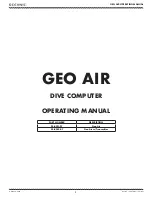
Dominant Chord
The fifth note of a diatonic scale begins the Mixolydian mode. When we choose
the 1st, 3rd, 5th notes of this mode, it produces a
dominant chord
. A dominant
chord, whether it has three, four, or five notes, creates harmonic tension when
played as part of a chord progression.
The dominant triad is simply a major chord since the distance from its root and
second note is a major 3rd. However, when the 7th note of the mode is added to
the chord, it produces another minor 3rd interval between the third and fourth
notes. These four notes combine to produce a chord which sounds slightly dis-
sonate. This dissonance creates tension in a piece of music which is released by
moving to another chord, usually the tonic chord. This phenomenon will be dis-
cussed further in the Chord Progression Map section of this guide.
When we choose the 1st, 3rd, 5th, and 7th notes of the Mixolydian mode to
create a chord, we produce a chord known as a
dominant 7th.
The dominant seventh chord differs from the major seventh chord by the interval
between the 3rd and 4th notes of the chord.
Diminished Chord
The last note of the diatonic scale begins the Locrian mode. When we choose
the 1st, 3rd, and 5th notes of this mode we produce an interesting triad known
as a
diminished chord
. In the key of C major the Locrian mode begins on B.
Here the interval between the 1st and 3rd notes is a minor third and the interval
from the 3rd to the 5th is also a minor third.
When we add the 7th note of the Locrian mode to the chord, the interval
between the 5th and 7th notes is a major third (2 steps). This chord is some-
times called a
half-diminished seventh.
However, since the first interval is a
minor third, it is also known as a
minor seventh flat-five
chord. When the chord
has B in the root, it can be written Bm7<5. This chord is almost a regular minor
seventh chord, except that the third note of the chord is a half-step lower than it
would be normally.
16
1
2
3
4
5
6
7
8
G
w
w
h
w
w
w
h
G
A
B
C
D
E F
G Myxolydian
5th mode of C major
Gdom7 (G7)
{
{
Major 3rd
Minor 3rd
{
Minor 3rd
w
h
C
w
w
h
w
w
D
E
F
G
A
B C
Cmaj7
C Major Scale
{
Major 3rd
{
Major 3rd
{
Minor 3rd
















































